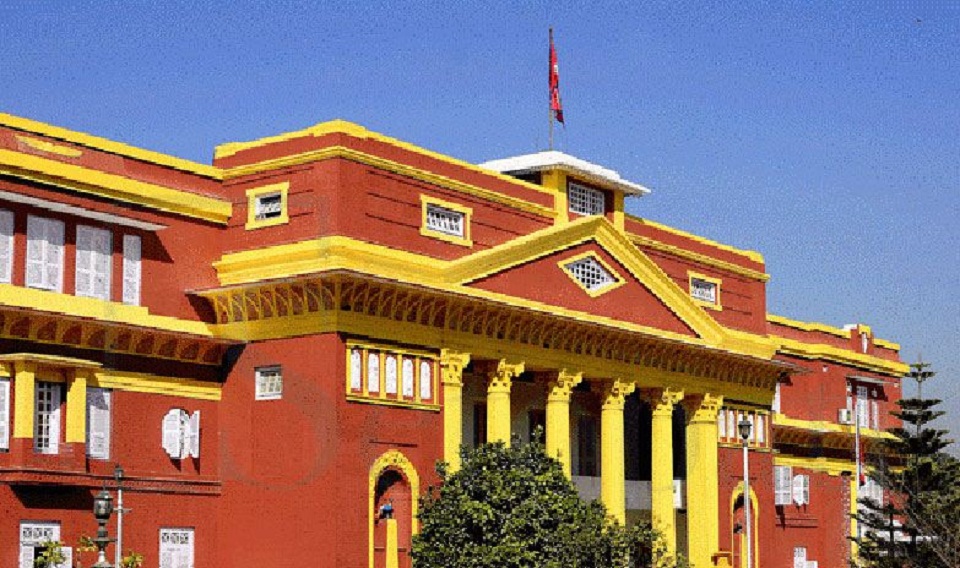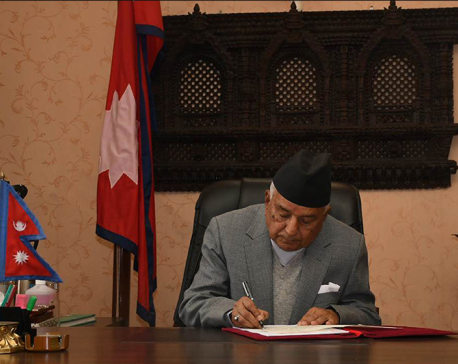
OR
Opinion
Stop the Misuse of Presidential Power of Pardon
Published On: March 12, 2023 09:10 AM NPT By: Ravi Nayak

More from Author
Nepal recently got a new president and there are high hopes among the citizens from the new president, Ram Chandra Poudel. Every citizen expects that the new president will act as a guardian and protector of the constitution and will not act against the norms of the constitution and law, unlike his predecessors. On various occasions, the citizens felt that the president, who is the guardian as well as the protector of the constitution, had violated the norms of the constitution. One of such occasions is the president exercising the power of pardon as guaranteed by the constitution to the president.
A pardon is an act of mercy, forgiveness and clemency. Power of pardon, is an extraordinary power exercised by the head of the state. In Nepal, the power to pardon is a part of the constitutional provision. The Black’s Law Dictionary defines the word “pardon”, as “the act or an instance of officially nullifying punishment or other legal consequences of a crime.” The power of pardon emerged in Britain, where it was a part of the royal prerogative. Pardoning means removing sentence and the conviction completely with absolving the convict from all sentences and punishments. The US Supreme Court in 1927 in the case of Biddle v Perovich, Holmes J. declared that, “A pardon in our days is not a private act of grace from an individual happening to possess power. It is part of the constitutional scheme. When granted it is the determination of the ultimate authority that the public welfare will be better served by inflecting less than what the judgment fixed.”
The main purpose behind pardoning authority is to repair potential judicial errors, as judiciary administered by humans occasionally may contain the flaws while delivering justice. Pardoning corrects the possible judicial errors and miscarriage of justice. However competent and efficient the judiciary may be, the human system of judiciary administration can’t ever claim to be free from imperfections. This is the main essence of granting power to pardon to the head of the state in order to avoid the miscarriage of justice. Power to pardon was meant to correct the judicial errors, in case anyone has been wrongly convicted or when the punishment was unduly excessive. However, the power of pardon has often been misused to absolve criminals, who have been jailed to discipline them and to deter them and others from indulging in wrongful acts.
As far as the history of Nepal is concerned, the first constitution of Nepal promulgated in the Rana regime, gave the power to Shree Teen Maharaja (the then Rana prime minister) to grant pardon, reprieves, respites, or remission of punishment under Article 59 of the Government of Nepal Act 1948. Since then, the power of pardon as a constitutional prerogative continues to exist in every constitution of Nepal, and the existing constitution, the Constitution of Nepal 2015, under article 276, grants the president the power to pardon. The article reads, “The president may, in accordance with law, grant pardon, suspend, commute or remit any sentence passed by any court, judicial or quasi-judicial body or administrative authority or body.”
Under Article 276 of the constitution, section 159 of the Criminal Procedure Code 2017 has provisions related to the process of pardon. Section 159 of the Criminal Procedure Code has laid down the process about how a convict may make a petition to the president through the Ministry of Home affairs for a pardon, suspension, alteration or reduction of sentence.
However, the same section restrict to grant pardon to the convict, convicted of offence of corruption, torture, rape, murder in a cruel and inhumane way or by taking control, genocide, explosives, kidnapping, hostage-taking or enforced disappearance, human trafficking and transportation; money laundering, and narcotic drugs trafficking or transaction punishable by a sentence of imprisonment for a term exceeding three years. Section 37 of the Criminal Offenses (sentencing and execution) Act 2019 deals with the remission. Rule 29 (1) of the Prison Regulation 2020 states that pardon should be provided to those convicts whose behavior is decent and pardon should be only granted after the convict has served fifty percent of the punishment. However, rule 29 sub-rule (1A) restricts granting pardon to the convicts who are convicted for the offence of, murder, rape, escape from prison or who assist drugs, corruption, espionage, crime related to heritage and smuggling. The Punishment, Pardon, Suspension, Commute or Rebate-related Directive 2071 issued by the home ministry has also similar provisions.
Pardon issued by the president under Article 276 of the Constitution of Nepal is the order that completely absolves the guilt of the offender. The convict who received the pardon from the president becomes free to live in a society as they had never committed any offense and live a normal life in the society without any blemish of being a criminal and enjoy all the rights as normal citizens do. Also, after receiving the pardon, the disqualification attached to the conviction ends. Hence, the legal effect of pardon is to absolve the person of the stigma of guilt of committing the offense.
The power of pardon is an awesome power as when it is used as intended, it is a powerful tool for justice but if it is used inappropriately then it serves as a tool of greed and perversion. Unfortunately, the exercise of pardon by the president has come under severe criticism in Nepal.
Outgoing president Bidya Devi Bhandari has courted controversy for abuse of the power of pardon. The power of pardon is surrounded by political vendetta and party favoritism. This power has been misused for political reasons or extraneous factors and is inaccessible to the ordinary people.
In Nepal, the president upon the recommendation of the government, every year on the occasion of the Republic Day, Constitution Day and Democracy Day, pardons, suspends, commutes, or remits the prison terms of some convicts. Following the trend, this year as well, on the occasion of the Democracy Day, outgoinh president Bhandari pardoned 12 convicts. Among those who got presidential pardon, one of them was Pushkar Gautam, who was convicted for the murder of Ujjan Shrestha of Okhaldhunga in the insurgency era. Gautam was sentenced to life imprisonment for murder charge. Another was Arun Kumar Chaudhary, a legislative member from the Rastriya Unmukti Party, who was convicted for torching a tractor belonging to an individual and slapped with six months of jail along with a fine of Rs 900,000. It is interesting to note that Chaudhary was pardoned before he could serve the jail term associated with his crime.
The most controversial presidential pardon is that of Bal Krishna Dhungel in 2018, whose recommendation was made by Baburam Bhattarai-led government. But before the pardon was approved by President Bidya Devi Bhandari, a petition was filed by the victim’s brother in the Supreme Court for quashing the recommendation of Bal Krishna Dhungel for pardon. The constitutional bench quashed the government's recommendation for pardon and upheld the court’s verdict. The Constitutional Bench also observed that the power of pardon should not be utilized unlimited, uncontrollably and arbitrarily and the president should be aware and sensitive while utilizing the power of pardon. While exercising the power of pardon, the legal norms and rule of law should not be abused. Similarly, presidential pardon was provided to the corruption convict Pradeep Jung Pandey in 2015 whose recommendation was made by the Sushil Koirala-led government.
Worse still, presidential pardon was granted to various convicts who had not spent a single day in prison, despite being convicted for various crimes. The convicts should be in jail to get pardon. In Nepal, the presidential pardon seems to be a political pardon and abuse of constitutional power granted to the president. The power is a vehement attack over the rule of law, legal norms, independence of judiciary and functional democracy. President, who is the protector and guardian of the constitution, seems to be abusing the constitutional values by misusing the power granted by the constitution. Indeed, even there seems to be discrimination while exercising the power of pardon, as on various occasions it seems that, co-accused of the same incident have been granted pardon whereas the other co-accused don't.
Indeed, there is a need for a separate specific act which will specifically deal with the pardon and on which scenarios the pardon should be granted and to whom it should be granted or not with. Let’s hope that the new president will not let down the citizens and act as the guardian of the constitution and won't misuse the power of pardon.
You May Like This

President’s bad precedent
The President must not forget the fact that the appointments of several advisors come at a cost to taxpayers, and... Read More...

Safeguarding constitution and democracy will be my first duty: Prez candidate Poudel
KATHMANDU, March 6: Senior leader of the Nepali Congress Ram Chandra Poudel has said that he considers the matter of... Read More...

President, PM congratulate Korean President
KATHMANDU, May 10: President Bidya Devi Bhandari and Prime Minister Pushpa Kamal Dahal have sent their separate congratulatory messages to... Read More...









Just In
- Heavy rainfall likely in Bagmati and Sudurpaschim provinces
- Bangladesh protest leaders taken from hospital by police
- Challenges Confronting the New Coalition
- NRB introduces cautiously flexible measures to address ongoing slowdown in various economic sectors
- Forced Covid-19 cremations: is it too late for redemption?
- NRB to provide collateral-free loans to foreign employment seekers
- NEB to publish Grade 12 results next week
- Body handover begins; Relatives remain dissatisfied with insurance, compensation amount








Leave A Comment